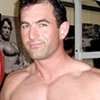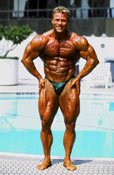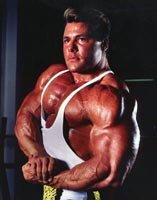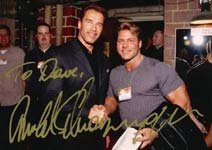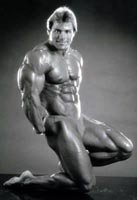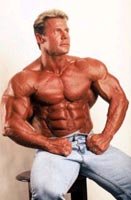By the 80s, professional bodybuilding had become very popular and, it was at this time, many of its greats were awarded their pro cards. After winning the NPC Mr. USA, and thus attaining his pro-card, Dave Hawk established himself as one of these pro-bodybuilding immortals as he went on to place highly in every pro-show he entered in the mid to late 80s, and made a name for himself as a marketing consultant and fitness specialist. Today, Dave still works in these areas.
In addition, he manages a number of WWE and TNA professional wrestling athletes. A life-time lifter and health advocate, Dave continues to train hard and will contest the next Masters Olympia. Dave is renowned for his great conditioning and excellent symmetry, and is still making significant physical improvements (as the accompanying photos illustrate).
In the following interview, Dave gives an excellent overview of his life in bodybuilding and provides valuable commentary on the finer points of muscle-building.

[ Q ] Give us some background Dave. What drew you to the sport of bodybuilding and what titles have you won?

- I Grew up in Pittsburgh, PA with 3 older sisters. Started weight training 16 years of age (1979), and was 5'7", 135 pounds. I was too small to really excel at sports. I primarily enjoyed football and the passion was there, but the genetics weren't.
As a JR in high school I began weight training for the same reasons most young guys do - to get bigger and stronger. In high school I joined a weight lifting club called the 300 pound bench press club, and if you worked out, this was the IN thing. This bench club gave me my first goal to strive for.
Within one-year of consistent training I hit the mark in the beginning of my senior year. What was even greater in the process of trying to obtain the bench goal was that I gained close to 20 pounds, put 2 inches on my arms and 12 inches around my chest. I also started to get the nick name of Arms!
In the beginning I never knew what to really expect from my training. I found out that with a little dedication and effort, all the hard work pays off. When you set a personal goal and begin to accomplish it, it improves one's self confidence which improves one's life.
During my senior year, I read my first bodybuilding magazine. This was IronMan and Bill Pearl was on the cover. Bill was my first Bodybuilding idol, then came Arnold and Frank Zane.
What really sparked my interest in competition was an article in the publication on a rising star, Teen Mr. Pennsylvania, Ron Teufel. When I read Ron's article it sounded like me and it set my mind on fire to compete.
In 1980, while training for football, I found out about a bodybuilding contest called the AAU Teen Mr. Pittsburgh, Jim Manion was putting on. I enjoyed training, so I gave up football and trained strictly for this show. It was at this point I dedicated myself to the sport of bodybuilding.
Dave's Titles Include:
- 1980 - NPC/AAU Teen Mr. Pittsburgh, 1st Medium Class
- 1980 - NPC/AAU Teen Mr. Pennsylvania, 1st Medium Class, 2nd overall
- 1980 - 10th in Teen Mr. America, had my butt handed to me by Jeff King from Ohio..
- 1980 - NBA Natural Mr. USA, 1st Medium Class, 2nd overall.
- 1981 - NPC/AAU Overall Teen Pittsburgh
- 1981 - AAU Teen Mr. America, 3rd Light Heavy Weight
- 1982 - NPC Teen Mr. Pennsylvania Over all, 1st Light heavy weight
- 1982 - NPC Mr. Pennsylvania, 1st place Light Heavy Weight, 2nd overall
- 1982 - NPC Teen Mr. America 1st place Medium, 2nd Overall.
- 1983 - NPC JR Nationals, 1st Light Heavy weight, 2nd overall
- 1984 - NPC Mr. USA, 4th Heavy Weight
- 1985 - NPC Mr. USA, Overall, 1st Light Heavy Weight
- 1985 - IFBB World Games, Overall and 1st Light Heavy Weight
- 1986 - IFBB Los Angeles Pro, 4th Place
- 1986 - IFBB Night of Champions, 4th Place
- 1986 - IFBB World Pro Ohio (now Arnold's Classic), 4th Place
- 1987 - IFBB Night of Champions, 7th Place
- 1987-90 - Off (Family time)
- 1991 - IFBB Night of Champions, 13th
- 1991 - IFBB Pittsburgh Pro, 10th
- 1992 - IFBB Arnold Classic, Did not make top 6?
- 1992 - 2001 - Retired?..
- 2002 - IFBB Masters Olympia, 4th
- 2003 - IFBB Masters Olympia, 4th

[ Q ] What's your current age, weight and height?

Age:
- 42
Height:
- 5'8"
Weight:
- 235-240 (off season)
Contest:
- 220-225

[ Q ] What are you doing these days Dave?

- Still raising three beautiful children with my wife of 21 years.
For 17 years I've been self employed and have worked as a marketing consultant and fitness specialist for Basic Media Group, Solae and GNC. I also work in sports management with a few clients contracted with WWE and TNA professional wrestling.

[ Q ] I hear you are also preparing for the 2005 Masters Olympia and the Canadian Pro. How much of your time is currently spend on preparation for these events?

- I hope I am? The Masters Olympia has not been scheduled to date, and depending on my work schedule and my son's show schedule, I will try and hit either the Canadian or NY depending on timeline which is still TBD.
I train around 12 to 16 weeks for a show. 12 hours a week with a ratio of 50% weight-training and 50% cardio.

[ Q ] Describe your current training schedule.

- I workout 5 days a week for about one-hour-a-day in the off season. Two days at home (garage) on
Powertec equipment
- and 3 days at a gym.
Day 1: Chest, Biceps, Forearms
Day 2: Hamstrings, Calves, Abs
Day 3: OFF
Day 4: Back, Traps
Day 5: Shoulders, Triceps
Day 6: Quads, Calves, Abs
Day 7: OFF

[ Q ] What is your diet like at the moment?

- In the off season I try to get in around 4000-4500 calories a day. 45% carbs, 35% protein and 20% fats.
Normally My Diet Is Around:
450-475 gm carbs, 350-400 gm protein, 95 gm fats.
My Daily Protein Consists Of:
60% Protein Food: egg whites, flank steak, chicken breast, and fish.
40% Protein Powders: blends of Soy 45%, Whey 35%, and Caseinate 20%.
Complex Carbs - (Oat Meal, Yams, Brown Rice)
Fats - (Olive oil, Natural Peanut Butter and Almonds)
For extra calories I normally make sandwiches made of whole wheat bread, peanut butter and jelly. Otherwise my diet is pretty clean.

[ Q ] How will your training and diet change leading up to next year's competitions?

- For diet I reduce my calories lightly by cutting carbs approximately in half from 400 to 200, but then increase my clean unsaturated fats to replace most of the calories lost from these carbs. This way I still have energy and calories to stabilize my muscle, but have reduced the carbs enough to help me burn fat and get cut.
But there is no guarantee this will get me where I need to go. The bottom line is looking in the mirror, checking your weight and adjusting your diet according to weekly changes. I try to lose only about 1 to 2 pounds a week at most.
Something I've learned in my many years of training is there is no single way to diet. Each year it's always a little bit different.
For training I add cardio in the morning and in the afternoon. At the beginning, I start with 15 minutes first thing in the morning and 15 minutes in the evening. As my cardio condition improves each week I increase my intensity to where I get up to 1-hour in the morning and 1-hour in the evening for 4-weeks before a show.

[ Q ] You competed in the 2002 and 2003 Masters Olympia. I have seen the photos of these events and you looked awesome. Describe your experience of competing at these Masters events.

- At the 2002 Masters I competed at a solid 204 and it was a great feeling to be back on stage. My goal was to just get there, win or lose, and I accomplished that. Honestly, it was a great feeling, but was nerve racking. Similar to when I started as a teen. My only consolation over the other top competitors like
Don Youngblood
- , was the fact that it was my first time back in 10 years.
If I didn't do well I' d just blame it on my years off. Prejudging was the toughest because the guys I competed against were incredible and I felt a lot of mental pressure. Anyone who competes normally puts his or her heart and soul into preparation and you never want to get you're a$$ handed to ya, but when you're on stage for the first time in 10-years and you get picked first in the call outs, it feels incredible to be back. Then you just do your best. At the night show you have fun and give the folks who came to see you a good showing of appreciation.
In 2003, it was a little different. I had time to think, and since I placed 4th last year I was fired up and set my sights on winning in 03. In 2003, I came back 18-pounds heavier and tighter so I thought WOW, maybe I can win this one. To my surprise it didn't happen that way.
Actually, I got sick the morning of Friday prejudging and spent most of the morning throwing up. This caused me to strain the right side of my neck and trap. I found out later that the eggs on the buffet I ate that morning were undercooked, and a few other fitness competitors got sick as well.
This made prejudging extremely hard as I was very dehydrated and flat which made it almost impossible to pose. I even had to hold myself back from not throwing up on the judges. But I wanted to be there and fought it out. Rich Gaspari later that day thanked me for not chucking on stage, or especially on him. He knew I was very sick and I was directly in front of him during the call outs.
Luckily, the night show was the following day. I didn't feel one-hundred-percent but was well enough to present myself better. I found out that I went from being around 7th place on the Friday to 4th (and almost 3rd) on the Saturday. Many people on Saturday said they thought I should have taken second. Well, what's it matter. I was just happy to be in the top five again. All the guys there were great.

[ Q ] I understand your son David is preparing to compete in next years Teen Nationals and Jim Manion's Pittsburgh, and you will be his training partner for these events. At what age did David begin bodybuilding?

- David began weight training at 14 but actually began more bodybuilding at 16. I enjoy training with David as it gives us an activity we enjoy together, and which gives us time to talk. Hopefully we'll be training partners for many, many years to come.
When David was much younger I participated as his youth wrestling and football coach for about 8 years. When he hit JR high, I had to step back and watch from the sidelines. As a father, you like to be in there with your kids, but they also need room to grow and be independent. Now that David's 18 and competing, I can again participate as a coach, training partner, father and friend.
I'm thankful we do have a great relationship and that he does listen to me and respects me enough to guide him. This doesn't mean we don't have arguments - we do! Actually, we are too much alike. But its all good and he knows I love him to death and want nothing but the best for him.
David and I have similar interests but watching him compete in bodybuilding is by far the best. He's actually a much better bodybuilder than I was at his age and his stage presence is something to see.

[ Q ] Did you encourage him from the beginning or was he inspired by your success to compete?

- Maybe a little of both, but David is his own man with good judgment and has his own ideas and for now enjoys the amateur competition. He's been around the sport for years, travelling with me. He has seen bodybuilding up close and he knows what he likes and doesn't like.
David's said he doesn't aspire to be a pro bodybuilder, nor does he really want that look. David sees himself looking more like a Frank Zepe fitness model in the future, hopefully finding a career in commercial work or sports entertainment. I'll support him in whatever direction he takes.
What started David? He played sports and wanted to get bigger for football and Lacrosse. Sounds familiar. He was also at a great age to begin weight training. In 2001 I was getting ready to participate in a fitness program with GNC and Physical Magazine called Dave Hawk's Return to Dominance.
It was a program designed to show guys in their mid to late 30's how to get back into shape properly, after an extended layoff. Since I was doing this program, I asked the publication if we could also add a beginners program and, if so, David would also participate.

[ Q ] Describe your involvement with Olympic, and now professional, wrestling great Kurt Angle.

- I'm foremost Kurt's friend but have the privilege of being his trainer and business manager.

[ Q ] How instrumental were you in helping him to attain his current physique?

- As his trainer, like any trainer, I assist in making suggested changes in his routine, dieting and nutrition but all-in-all its Kurt's hard work and
- that get him results.

[ Q ] You have trained many people over the years. What attributes are essential to be a successful trainer in your view?

- To be a great trainer you have to enjoy what you do and I eat, sleep and live this fitness lifestyle. A key to being a successful trainer is finding your way of teach others how to love and enjoy fitness as much as you do.
- This is something you can't learn from a book, or school. It comes from the heart.

[ Q ] What would you consider to be your biggest achievement in bodybuilding?

- Most people may think that winning a show is a great achievement. My feelings of achievement occur when I meet with a fan or followers, and I learn I've affected their life in a positive way. That's a great feeling of achievement.

[ Q ] Any disappointing moments?

- None - I always try to look at the positives of things and block out the disappointments.

[ Q ] What would you consider to be your main strengths and weaknesses?

Strengths:
- Symmetry - Balance
Weakness: Thick muscle density.

[ Q ] What are your non-bodybuilding related interests and hobbies?

- I most enjoy going on vacations with my family, playing golf, and any outdoor activity.

[ Q ] If you could give one piece of advice to an aspiring bodybuilding, what would it be?

- Try to live a balanced life. Bodybuilding should be only one aspect of your life. It is such a selfish individual hobby, it can consume you. You must keep in mind that there are things in life, other than how you look.

[ Q ] What are the keys to a successful competitive career in bodybuilding in your opinion?

- Again, a balance in your life and an understanding that you can use your hard work and great physique for more than winning shows. Your body reflects the fact that you are a dedicated individual, who can set a goal and achieve it. Use this principle in all aspects of your life to gain respect. Respect nurtures success.

[ Q ] What degree of importance would you attribute to diet and aerobic training when building mass?

- is 80% percent of the total deal, and to get results, a good diet is really needed year round with the right percentages of Carbs to Protein to Fat based on your own lean bodyweight. The differences between my mass-building-diet as compared to a cutting diet, is in the changes in the type of calories eaten.
When bulking, I eat more calories from complex carbs and less fat. When cutting, I cut carbs down but increase unsaturated fat for calories to have muscle energy for intense training. I never get super fat and bulky like I once did. I try and stay about 10% out of contest shape year round because it's much too hard on your body to cut a lot of fat without losing muscle size.
Aerobic's or cardio at low impact for about 20 minutes a day 4-days-a-week, or every other day in the off season, is important if you have the time. It helps keep your metabolism up and burn excess fat and calories when at higher nutrition intake than normal.
It also helps with the stimulation and release higher percentages of growth hormone, which helps in muscle recovery, as compared to not doing any cardio.

[ Q ] In your experience, is supplementation worth considering, and if so, what supplements would you recommend and why?

- Yes, supplementation is important.
- ,
- ,
- and
- - for general good health and energy, vitamins and minerals also support your metabolism by helping you metabolize certain foods.
Protein Powders - to support lean muscle growth while raising nitrogen levels.
50% - From Blends Of Proteins Soy, Whey and Caseinate) - in between meals for additional protein needs.
50% - Protein Isolates (Soy or Whey): Fast acting protein for the early morning, immediately before and after training.
Creatine - 5-grams 1-hour before training, 5-grams after training a day to help improve and spike strength 10 to 15-percent.
L-Glutamine - 5 in morning, 5 after training, 5-grams before bed a day to improve recovery time and keep immune system strong.
BCAA's - 3-grams 1-hour before training daily to improve muscle energy while keeping the metabolism functioning optimally.
HMB - 3-grams a day to help prevent muscle wasting and soreness.
ZMA - before bed, to boost natural test levels while improving rest (sleep-mode) recovery.

[ Q ] How important do you consider goal setting to be?

- The most important aspect. If you don't set a goal, how can you focus on a result.

[ Q ] What do you do to psych yourself up for major contest?

- I don't psych myself up. I get focused and stay focused. What I find stimulates my focus and motivation is reading information in the many fitness publications available, while also surfing websites like
Bodybuilding.com
- to see who's up and coming on the pro circuit. I don't really look at who's on top of the IFBB ladder, but I play off the energy of the new breads coming up and try to stay ahead.
This is one reason it's so fun to train with David and our other training partner John Rearick, 28. Their hearts and passion to win and be the best is displayed their training intensity. When I'm tired and burnt from a long day at work, I feed off their youth and passion, and try to show them that this 42-year-old is not slowing up.

[ Q ] Is your bodybuilding success attributable to the possession of good genetic potential or have your results come largely through consistent effort? What percentage of each do you think?

- It's 50/50 basically. I have good genetics, not great genetics. My good genetics give me a balanced look, but I also lack the thick muscle bellies which some others tend to get easier. Good or fair genetics will only take you half-way to success. The other half comes from the individuals willingness to sacrifice, train intensely, and dedicate themselves to the goal of winning.

[ Q ] What was the bodybuilding culture like around the time of your first professional show, 1986 IFBB Los Angeles Pro Championships? In your view, how has bodybuilding changed since then?

- To me bodybuilding back in the mid 80 and early 90's was a bit more realistic, more marketable and a little healthier than today's standard. I'm still not sure why the standards changed so drastically and guys had to become so freaky to win the contests.
- Back then you needed good muscle size, symmetry, balance, a good routine and a small waist line which drove more mass appeal and more consumer awareness and key sponsor interest. None of which seems to be a real standard of the sport today. This actually causes the sport to lose ground, to lose consumer acceptance and really lose key business sponsorships.
I feel for the upcoming competitors who love the sport because the industry demands unrealistic looks where the risk really out weighs any reward, and the little niche market it does have keeps getting smaller and smaller each year. I love participating in pro competition but "Thank God" I don't depend on it for my lively-hood.

[ Q ] How long do you plan on competing as a bodybuilder?

- A few more years, I hope. Win or lose I just truly enjoy being part of the sport and having this activity as part of my life. I have a healthy body and the ability to keep it fit so I will continue to challenge myself while trying to reach personal fitness goals.

[ Q ] Have you any plans for your post-bodybuilding life?

- I think I'm in my post bodybuilding life and have been for many years. I compete for the fun of it, not as a career, but as a way of self expression and it gives me the opportunity and enjoyment with my son and his fitness future.
